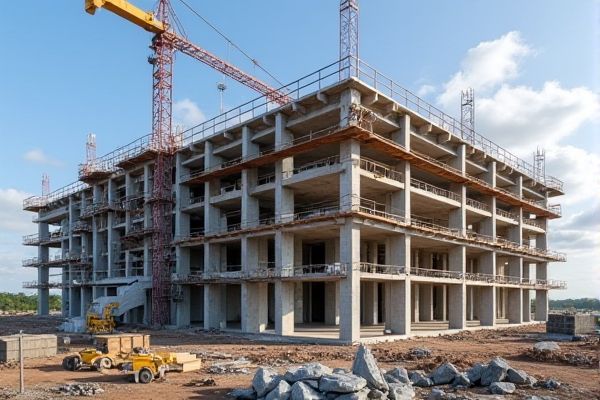
Structural engineering positions in Thailand encompass a variety of roles that are critical in the design and construction of buildings, bridges, and other infrastructure projects. Many firms seek professionals with expertise in seismic design, material science, and sustainable engineering practices. Career opportunities are available in both public and private sectors, with a growing emphasis on innovative solutions to meet urbanization challenges. Proficiency in software such as AutoCAD, SAP2000, and BIM tools can significantly enhance a candidate's prospects in this competitive field.
Job Description
Structural engineering jobs in Thailand involve the design and analysis of infrastructure such as buildings, bridges, and various construction projects. Professionals are expected to ensure safety, compliance with regulations, and sustainability in their designs while considering local material availability and environmental factors. Mastery of engineering software and proficiency in local codes contribute to successful project outcomes, making these positions highly sought after. Opportunities for career growth exist, as the demand for skilled structural engineers continues to rise in Thailand's rapidly developing construction sector.
Requirement
Structural engineering jobs in Thailand typically require a bachelor's degree in civil or structural engineering from an accredited institution. Proficiency in design software such as AutoCAD, SAP2000, or ETABS is essential, along with a solid understanding of local building codes and regulations. Candidates often benefit from practical experience through internships or previous employment in construction or design firms. Strong communication skills and the ability to work collaboratively in team settings are highly valued by employers in the region.
Salary and Perks Expected
Structural engineering jobs in Thailand offer competitive salaries that typically range from THB 30,000 to THB 100,000 per month, depending on experience and qualifications. Many companies provide attractive perks such as health insurance, annual bonuses, and opportunities for professional development. The demand for skilled structural engineers continues to grow, especially with ongoing infrastructure projects and urban development. Networking within the industry and obtaining relevant certifications can further enhance your job prospects and salary potential in this field.
Similar Job Names
- Structural Engineer
- Senior Structural Engineer
- Structural Analysis Engineer
- Design Engineer (Structures)
- Project Engineer (Structural)
- Civil Engineer (Structures)
- Structural Inspector
- Structural Detailer
- Structural Draftsman
- Geotechnical Engineer
- BIM Engineer (Structural)
- Structural Consultant
- Site Engineer (Structural)
- Assistant Structural Engineer
- Structural Project Manager
Job Expectation Concept
The job expectations for structural engineering roles in Thailand involve a strong emphasis on technical skills and knowledge of local building codes. Engineers are often required to collaborate with multi-disciplinary teams, which includes architects and construction managers, to ensure projects meet safety and quality standards. Keeping abreast of emerging technologies and sustainable practices in construction can significantly enhance your value in the job market. Networking within the industry and obtaining relevant certifications can further improve career advancement opportunities in Thailand's growing infrastructure sector.
Career Advantage and Weakness
Structural engineering jobs in Thailand offer significant career advantages, including a growing demand for infrastructure development fueled by government projects and private investments. You can gain exposure to modern engineering practices and innovative technologies that enhance your skills and expertise in the field. However, challenges exist, such as a competitive job market and varying salary ranges depending on experience and qualifications. Understanding local regulations and construction standards is crucial for success in navigating the complexities of structural projects throughout the country.
Important Thing Must Know
Structural engineering jobs in Thailand offer diverse opportunities, driven by the country's rapid infrastructure development. You may find positions in various sectors, including commercial, residential, and industrial projects, all contributing to urban growth. Knowledge of local building codes, regulations, and environmental considerations is crucial for success in this field. Networking with industry professionals and joining relevant organizations can greatly enhance your job prospects. As Thailand continues to invest in infrastructure, the demand for skilled structural engineers is expected to rise, providing a stable career path.
Alternative Career Options
Structural engineering graduates in Thailand can explore diverse career options beyond traditional roles. You may consider positions in project management, where overseeing construction projects allows you to utilize your engineering knowledge while developing leadership skills. Opportunities in consulting firms provide a chance to advise on infrastructure developments, focusing on sustainability and innovative designs. Engaging in research and development within academic institutions or governmental organizations can also lead to impactful contributions in advancing engineering practices in the country.
Companies List
- CP Group
- SCG (Siam Cement Group)
- PTT Public Company Limited
- Charoen Pokphand Foods
- Thai Oil Public Company Limited
- Bangkok Expressway and Metro Public Company Limited
- POSCO Thailand
- TPI Polene Public Company Limited
- True Corporation Public Company Limited
- Thai Airways International Public Company Limited
List of Ideal City
Bangkok stands out as the bustling hub for structural engineering jobs in Thailand, with numerous large-scale construction projects and infrastructural development. Chiang Mai offers a more relaxed environment while also seeing a rise in engineering opportunities, especially related to green building and sustainable design. Phuket, known for its tourism, presents unique challenges in structural engineering due to its coastal location and natural elements. You can find growing prospects in smaller cities like Khon Kaen and Nakhon Ratchasima, which focus on regional development and infrastructure improvements.
 jobs-thailand.com
jobs-thailand.com